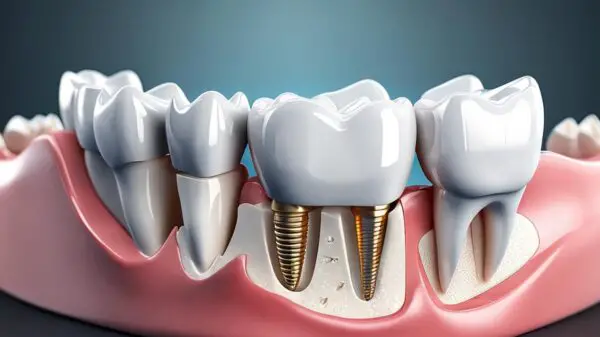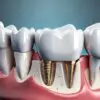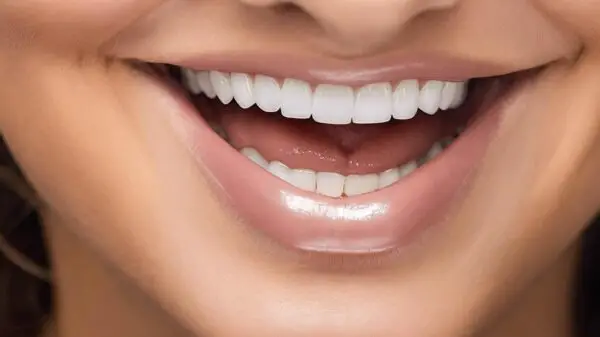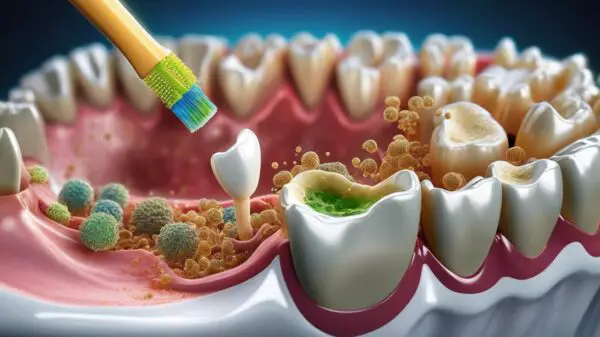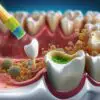What’s the Correlation Between Dental Health and Diabetes?
Most people understand the importance of healthy teeth and gums; after all, they are essential for speaking clearly, chewing properly, and smiling with confidence. However, what most don’t know is that poor dental health can actually have a negative effect on overall health in general – particularly when it comes to diabetes. Recent studies have pointed to a correlation between dental hygiene and certain co-morbidities found in diabetics. So, what is the correlation between dental health and diabetes?
The correlation between dental health and diabetes is that people with diabetes are at a higher risk of developing gum disease, tooth decay, and other oral health problems due to changes in blood sugar levels. Poorly managed diabetes can also reduce the body’s ability to fight off infections that may arise from poor dental hygiene or dental diseases.
In this blog post, we will discuss in depth what exactly this relationship between dental health and diabetes entails, how it can be managed through improved oral habits, as well as some preventative measures people with or without diabetes can take to ensure their oral health is top-notch!

The Importance of Dental Health
It’s important to understand that dental health is a critical part of overall health and well-being. Poor dental hygiene can lead to a number of oral health problems such as cavities, gum disease, bad breath, tooth decay, and even tooth loss. Not only does poor dental health affect your appearance, but it can also increase your risk for other illnesses and diseases. For example, studies have found that people with gum disease are at increased risk for developing heart disease and stroke. Additionally, research suggests that the bacteria associated with periodontal (gum) disease may contribute to complications in people with diabetes or respiratory illnesses.
That’s why dental hygiene is important for overall health and well-being. By following proper oral hygiene habits and visiting the dentist regularly, you can ensure that you take care of your teeth and make sure that your smile stays healthy and bright for years to come! So, keep reading to learn about the relationship between dental health and diabetes, your overall health, how to practice good dental hygiene, and more!
Dental Health and Diabetes
Diabetes and dental health are closely linked. People with diabetes are at higher risk of developing gum disease, tooth decay, dry mouth, and other oral health problems due to changes in blood sugar levels. Poorly managed diabetes can also reduce the body’s ability to fight off infections that may arise from poor dental hygiene practices or dental diseases. For these reasons, people with diabetes should take extra steps to safeguard their oral health by practicing good oral hygiene habits such as brushing regularly, flossing daily, and visiting the dentist for regular check-ups.
Regular visits to a dentist can help detect early signs of gum disease or tooth decay and make sure any problems are promptly addressed before they become more serious. Additionally, people with diabetes should inform their healthcare provider of any changes to their oral health as these may indicate an underlying issue with diabetes management. By making sure that both diabetes and oral health are properly managed, people with diabetes can maximize their overall health and well-being.
Keeping your teeth and gums healthy is essential for everyone, but especially for those with diabetes. Taking good care of your mouth can help you avoid serious complications from diabetes like dry mouth, tooth decay, gum disease, and other oral problems. Following a healthy lifestyle coupled with regular dental check-ups has been proven to be one of the best ways to keep yourself healthy. So if you have diabetes, don’t forget about your teeth – make sure to take extra steps to ensure that your oral health isn’t neglected.
How to Practice Good Dental Hygiene While Managing Diabetes
With these things in mind, here is a guide for keeping your gums and teeth healthy in conjunction with managing diabetes.
To maintain good dental health, it is important to brush your teeth twice daily with fluoridated toothpaste and floss at least once a day. Brushing helps remove plaque and food particles that can damage your teeth and gums.
1. Brush Your Teeth Properly
Here are some tips for brushing properly:
1. Start by using a soft-bristled toothbrush
Also, make sure to replace it every 3-4 months (or when the bristles start to fray).
2. Place the toothbrush against your teeth at a 45-degree angle
3. Brush in small circular motions or short back-and-forth strokes
This is to make sure all surfaces of the teeth have been brushed.
4. Clean your tongue by brushing it, as this can help reduce bacteria in the mouth.
5. Then spit out the toothpaste but don’t rinse your mouth with water after brushing.
This will help keep more fluoride on the teeth, which can protect them from cavities.
6. Make sure to brush before bed.
As saliva production is reduced while you sleep and this can lead to a buildup of bacteria in your mouth.
7. Use an antimicrobial or antibacterial mouthwash after you brush if your dentist recommends it.
This can reduce plaque and gingivitis, and freshen breath.

2. Floss Your Teeth Properly
Flossing helps clean the tight spaces between your teeth where bacteria can accumulate. Here are some tips for how to properly floss your teeth:
- Start by using a piece of floss that is 18 inches long so you have enough to wrap around your fingers.
- Use gentle pressure while sliding the floss up and down against both sides of each tooth, gently curving it around the base of each tooth as you go along.
- Use clean sections of floss as you move from one side to another in order to avoid spreading bacteria or other debris from one area to another.
- Make sure to floss the back side of your last tooth on each side of your mouth.
- Flossing should be done at least once a day for optimal dental health, preferably before bedtime as this will help remove any food particles that may have accumulated throughout the day.
3. See the Dentist Regularly
In addition to brushing and flossing, you should also make sure to visit your dentist regularly for check-ups and professional cleanings. A professional cleaning will remove any hardened tartar or calculus that may have accumulated on your teeth which would otherwise be difficult to remove by brushing alone. Regular professional cleanings help to prevent gum disease, cavities, and bad breath as well as maintain a healthy smile. By removing the built-up bacteria and plaque, it helps reduce the risk of developing issues like tooth decay or gum disease. In addition, regular teeth cleaning appointments can help identify any potential problems with the mouth early on, so they can be treated promptly. This can save money in the long run by avoiding more costly treatments down the road. All in all, professional teeth cleaning is essential for keeping your mouth healthy and a bright smile!

4. Limit Your Sugar Consumption
It is also important to limit how much sugar you consume as this can increase the risk of developing cavities. Eating a lot of sugary foods can cause bacteria in the mouth to produce acid, which breaks down tooth enamel and leads to tooth decay. Tooth decay can cause sensitivity, discoloration, bad breath, gum disease, and even eventual tooth loss.
If possible, try to reach for a piece of fruit or some vegetables instead of sugary snacks. Additionally, drinking plenty of fluoridated water can help strengthen your teeth and prevent cavities.
5. More Information
Finally, if you use tobacco products, it is important to quit as soon as possible. Tobacco use has been linked to an increased risk of gum disease and other oral health problems. If quitting isn’t an option, make sure to visit your dentist at least twice a year for check-ups and professional cleanings.
Good oral hygiene has an aesthetic component too – a healthy mouth contributes to a beautiful smile which can increase confidence and self-esteem. All in all, a person’s dental health should not be taken for granted as it is an important part of overall physical and mental well-being.
Conclusion
By following these simple tips and taking extra steps to take care of your teeth and gums, you’ll be well on your way to keeping your diabetes from negatively impacting your dental health. Thanks for reading!











